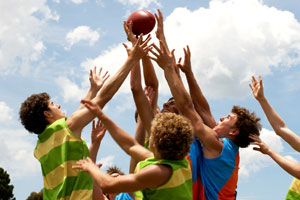HEALTH experts have hosed down public concern about concussion in sport on the back of media reports of chronic traumatic encephalopathy in American National Football League players.
The Australian experts said that media reports raised concerns about possible long-term neurological damage, cognitive impairment and mental health problems in players.
However, according to the experts, the risks facing elite sports professionals — and American footballers in particular — bear little resemblance to the risks in community sport in Australia. They stressed that inactivity was an established risk factor for many chronic illnesses.
Their responses follow the online publication today of two articles exploring the issue by the MJA.
According to an editorial by two senior doctors — neurosurgeon Dr Andrew Kay and neurologist Dr Paul McCrory— the debate around managing concussion in sport had been played out in the news media rather than through scientific journals and was based on only a “handful of case reports”. (1)
“Complex issues have been oversimplified and distorted, causing significant alarm over putative long-term risks and concern over how an acute injury should be managed”, wrote the authors, both based in Melbourne
They said the issues raised needed to be “tested in the cold light of scientific peer review”.
In the second article, public health researchers called for a collaboration between researchers and Australia’s three major football codes to investigate the cumulative effects of head traumas over long periods. (2)
The authors called for the introduction of standardised methods that track an athlete’s playing history and head injuries to allow valid comparisons.
Sports physician Dr John Orchard, who works with the Sydney Roosters rugby league club, agreed that high-quality, long-term follow-up studies were needed. He said that New Zealand was the best place to undertake this research because all amateur and professional sports injuries were covered by a government national insurance system.
“In my opinion, it would be silly for the government to put millions of dollars into a specific, massive concussion study when it may be money far better spent to try to replicate the New Zealand system for managing sports injuries”, he said.
Recall bias — such as when a depressed ex-footballer might more readily recall concussions than a happy ex-footballer — would be a potential problem in future studies, Dr Orchard said.
Professor Caroline Finch, from the Monash Injury Research Institute, said the issue of concussion in sport had been over-hyped by “incorrect and ill-informed media commentary”. However, she said the strong public reaction still needed to be addressed.
“It’s an incredibly important area. The fact that fear of concussion and other adverse outcomes might be misplaced and exaggerated raises other concerns. If parents say they won’t allow their kids to play, that will have bigger implications for the health of our nation”, she said.
Professor Finch said that in Australia there was hardly any data on the outcomes of athletes. “That is a big question mark.”
However, injury risk and management in elite sport differed significantly from that in community sport, she said.
“We need to get the message across that sport is a relatively safe activity.”
– Amanda Bryan
1. MJA 2012; Online 14 May
2. MJA 2012; Online 14 May
Posted 14 May 2012

 more_vert
more_vert
Do all doctors and sports first-aiders distinguish between concussion and brain-damage? I understand that a concussed patient recovers consciouness within forty minutes. If unconsciousness lasts longer brain-damage is the proper diagnosis.